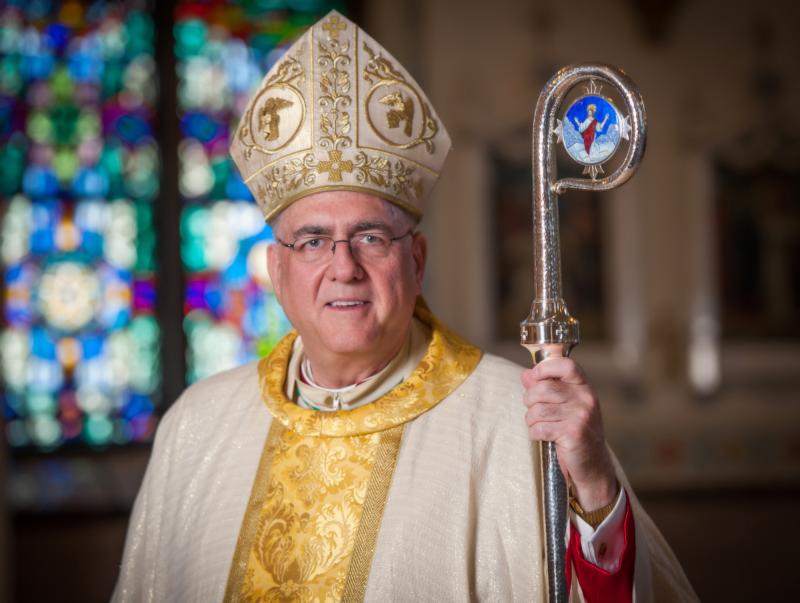
by Archbishop Joseph F. Naumann
The documentary “Francesco,” chronicling the ministry of Pope Francis and his solicitude for the poor, the refugee, the sick and all those on the margins of society, created quite a media firestorm.
Pope Francis continues to provide for the church and the world a beautiful example of love and compassion for all those who are suffering and struggling.
I have not viewed the documentary that is an edited version of lengthy interviews. The media has focused upon a segment of the film where the pope is evidently responding to a question about the pastoral care for those with same-sex attraction.
Not surprisingly, the Holy Father reaffirmed church teaching regarding the innate dignity of every member of the human family as one created in the divine image.
Pope Francis encouraged parents to love children and family members who struggle with same-sex attraction. He reminded viewers how important familial bonds are for all of us. The Holy Father expressed support for civil unions for homosexuals, specifically in order that individuals have access to health care and inheritance privileges.
While Pope Francis was archbishop of Buenos Aires, he had expressed support for civil unions in an effort to prevent state approval of same-sex marriage.
The Holy Father did not endorse same-sex marriage in the documentary, but once again offered the notion of civil unions as a means to avoid state sanctioning of homosexual marriage.
Pope Francis did not question or dispute the gravely sinful nature of homosexual actions. Moreover, no pope has the authority to change a moral teaching that is both rooted in the Bible, 2,000-year old tradition and the consistent moral teaching of the church.
Similarly, no pope has the ability to change the nature of marriage nor the church’s understanding of matrimony that is rooted in the Bible, church tradition and natural law.
Pope Francis’ apparent affirmation of civil unions differs from the opinion expressed less than 20 years ago by the Congregation for the Doctrine of the Faith that counseled against homosexual civil unions because of the confusion of equating them with marriage.
Frankly, those who have hailed the Holy Father’s proposal for civil unions as an initial step in changing church teaching on marriage actually illustrate the validity of the concern expressed by the Congregation for the Doctrine of the Faith.
The Holy Father’s remarks were made in a conversational interview, not with the care and precision necessary to articulate official church teaching.
The possibility of civil unions is an area of prudential judgment. However, the media treatment of the pope’s statements in the documentary actually reinforce the necessity for caution.
The Holy Father’s desire and efforts always to attempt to reach those on the peripheries are laudable and inspirational. The pope’s exhortation to families to keep close to those who struggle with same-sex attraction is pastorally wise, but must be balanced with care not to enable behaviors that are dangerous spiritually, morally, emotionally and physically.
We are fortunate in the archdiocese to have a chapter of Courage, a Catholic ministry to assist those with same-sex attraction who are striving to live a chaste life.
The members of Courage are some of the real heroes and saints of our day. Encourage is a sister ministry for families of those with same-sex attraction that help families walk that delicate balance of continuing to love their sons, daughters and siblings without enabling choices and behaviors that are harmful and destructive.
The virtue of chastity has always been challenging to live for singles, married couples, celibate priests, and consecrated religious Sisters and Brothers. It is even more so in our sexualized culture that boasts pornography as the leading internet enterprise.
Living the virtues has never been easy but it is rewarding. Moral norms protect us from dangerous and harmful activities that promise quick and intense pleasure but leave us empty and absent of joy. The virtues are guides to authentic love and developing true friendships.
This Sunday, we celebrate the solemnity of All Saints. There are many saints that are great examples of the virtue of chastity — e.g., Blessed Pier Giorgio Frassati, St. Aloysius Gonzaga, Blessed Carlo Acutis, St. Dominic Savio and, of course, the virgin martyrs — Agnes, Agatha, Lucy, Anastasia and Cecilia. One of the most recent of these young saints is Maria Goretti, who is both a patron for chastity and mercy.
As we celebrate the festival of the saints, let us ask them to intercede for us that we might excel like so many of them in the twin virtues of charity and chastity. May we have the same passion to serve the poor and vulnerable as we do to love authentically — not using another for pleasure but always seeking what ennobles others.

